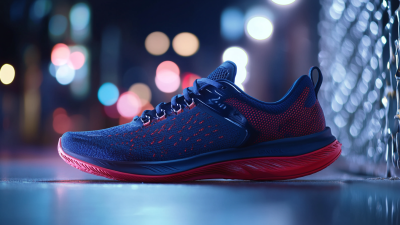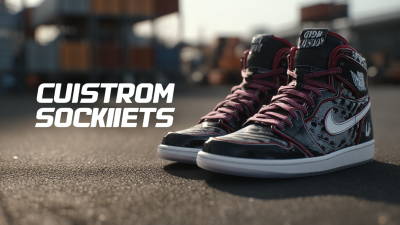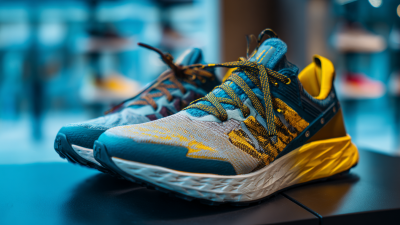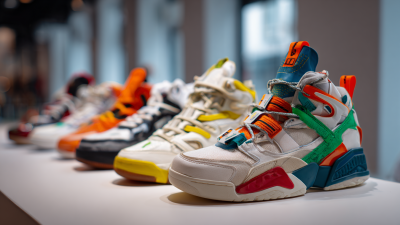
In recent years, the running industry has witnessed a significant shift towards personalization, particularly with the rise of custom running shoes. According to a report by the Sports and Fitness Industry Association (SFIA), nearly 35% of runners are now opting for footwear specifically tailored to their unique biomechanics and preferences.

Custom running shoes not only enhance comfort but also provide crucial support that can lead to improved performance and reduced injury rates. A study published in the Journal of Sports Sciences revealed that runners who utilized custom-fit shoes experienced a 15% improvement in running efficiency, a finding that emphasizes the importance of individualized design.
As the demand for personalized athletic gear continues to grow, understanding the science behind custom running shoes becomes essential for maximizing one's potential on the track and trails.
The biomechanics of the foot plays a crucial role in determining running efficiency and performance. Each runner has a unique foot structure and pattern of movement, which influences how forces are distributed across the body during a race. This individuality highlights the significance of understanding one's foot mechanics when selecting footwear; running shoes must be tailored not just to size, but also to the runner's pronation, arch height, and gait.
Custom running shoes can significantly enhance performance by providing targeted support and cushioning that align with a runner's specific biomechanics. For example, those with overpronation may benefit from shoes with additional stability features, while high-arched runners might find relief in shoes that offer more cushioning. By accounting for these factors, custom shoes help to optimize energy efficiency, reduce the risk of injury, and ultimately unlock a runner's potential, enabling them to achieve personal bests while enjoying the sport with lesser discomfort.
The individual gait is a crucial factor in running efficiency and injury prevention, and custom running shoes can significantly enhance this performance aspect. Research by the Journal of Biomechanics indicates that personalized footwear can mitigate common running injuries by up to 50% by addressing specific foot mechanics. Custom shoes are designed to accommodate variations in arch height, foot width, and pronation patterns, tailoring support and cushioning to each runner's unique needs.
Further analysis from Sports Medicine Reviews shows that runners fitted with custom footwear often experience improved energy return and comfort during extended runs. This is particularly essential for endurance athletes, as even minor adjustments in shoe fit and support can lead to noticeable differences in performance. By precisely aligning the shoe's design with an individual's gait, custom shoes not only enhance running efficiency but also foster a more enjoyable and sustainable running experience, empowering athletes to reach their full potential.
The evolution of running shoe technology is profoundly influenced by advancements in material science, which play a critical role in enhancing runner efficiency. Recent innovations highlight a growing trend toward specialized materials that optimize performance while addressing various environmental concerns. For instance, carbon-plated shoes have stirred debate within the running community, with proponents arguing that they significantly improve speed and efficiency, while critics express concerns over their accessibility and sustainability.
Moreover, new modeling techniques are emerging to predict how specific shoe properties directly impact a runner's performance. This tailored approach considers the unique needs of individuals, from seasoned marathoners to novice runners. In parallel, research is underway to create sustainable options that minimize environmental impact without sacrificing efficacy. This dual focus on advanced technology and ecological responsibility underscores a significant shift in the running shoe landscape, as manufacturers strive to balance performance, comfort, and sustainability in their designs.
The fit and comfort of running shoes play a pivotal role in injury prevention, which is essential for maximizing performance potential. A shoe that is properly fitted to the runner's foot shape contributes to better alignment of the body during movement. When shoes are too tight or too loose, they can lead to blisters, calluses, and ultimately, uneven stress on joints, which may result in long-term injuries. Therefore, selecting a shoe that accommodates individual foot characteristics, such as arch height and width, is crucial to maintaining overall foot health.
Moreover, comfort directly influences a runner's ability to focus on their performance rather than on discomfort caused by ill-fitting shoes. When runners prioritize comfort, they are more likely to enjoy their training sessions, ultimately leading to increased mileage and improved endurance. Custom running shoes, designed to cater to these specific needs, enhance the natural biomechanics of each runner. This personalized approach not only enhances the joy of running but also builds resilience against common running injuries, promoting a sustainable and rewarding running experience.
| Metric | Value | Importance |
|---|---|---|
| Weight of Shoe (grams) | 250 | Lighter shoes help improve speed and reduce fatigue. |
| Heel Height (mm) | 10 | Proper heel height aids in shock absorption and comfort. |
| Drop (mm) | 8 | The drop can influence running posture and injury risk. |
| Breathability Score | High | A high score reduces moisture buildup and enhances comfort. |
| Arch Support Level | Medium | Appropriate support helps in maintaining proper foot alignment. |
| Injury Rate Reduction (%) | 30 | Custom fit shoes reduce injury occurrence by improving comfort. |
Custom running shoes have transformed the experiences of many athletes, allowing them to maximize their performance through tailored support and fit. Case studies highlight several success stories that illustrate the profound impact these personalized shoes can have. For instance, a competitive marathon runner from Oregon revamped her training routine with custom shoes designed specifically for her foot structure. As a result, she reported a significant reduction in injuries and improved her marathon time by over 10 minutes, demonstrating that the right shoes can enhance both comfort and performance.
Another inspiring example is a recreational runner who struggled with chronic ankle pain. After consulting with a specialist and getting fitted for custom shoes, he experienced a remarkable shift in his ability to enjoy running again. The shoes provided him with added stability and cushioning, which not only alleviated his pain but also encouraged him to participate in local races. Such success stories emphasize the importance of understanding individual biomechanics and show how custom running shoes can unlock potential, allowing runners to push their limits without the fear of injury.






